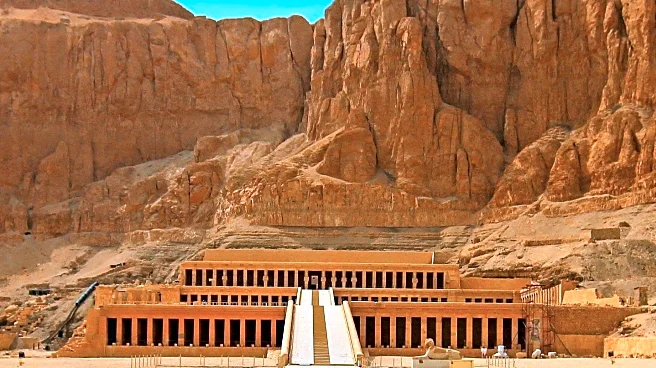What's Happening?
The Bahá'í Gardens in Acre, a significant religious site for the Bahá'í faith, are set to reopen to the public after a closure of two and a half years. The gardens, which include the Shrine of Bahá'u'lláh,
were closed in April 2023 due to a dispute with the Acre Municipality over property taxes. The city had argued that the site should be classified as a tourist attraction rather than a religious site, leading to a demand for millions of shekels in taxes. The Bahá'í World Centre announced that the dispute has been resolved, with the site's sacred status recognized, allowing it to reopen for guided tours and independent visits. Admission to the gardens will remain free, as is customary at Bahá'í sites.
Why It's Important?
The reopening of the Bahá'í Gardens is significant for both the local economy and the global Bahá'í community. The gardens previously attracted around 200,000 visitors annually, contributing to the local tourism industry in Acre and the Western Galilee. The closure had negatively impacted local businesses, including tour guides, restaurants, and merchants, who relied on the influx of visitors. The resolution of the tax dispute and the reaffirmation of the site's religious status not only restore a vital cultural and spiritual landmark but also promise economic revitalization for the area. For the Bahá'í community, the reopening reaffirms the sanctity of one of their holiest sites, enhancing opportunities for pilgrimage and prayer.
What's Next?
With the gardens reopening, local businesses and tourism officials are likely to see a resurgence in economic activity. The Bahá'í World Centre's decision to maintain free admission could encourage a steady flow of visitors, benefiting the local economy. The resolution of the tax dispute may also set a precedent for how religious sites are classified and taxed in the region, potentially influencing future municipal decisions. Stakeholders, including local government and business owners, will be closely monitoring the impact of the reopening on tourism and local commerce.
Beyond the Headlines
The reopening of the Bahá'í Gardens highlights broader issues of how religious sites are perceived and taxed by local governments. The initial closure due to tax classification disputes underscores the challenges faced by religious communities in maintaining their sacred sites amidst economic and bureaucratic pressures. This situation may prompt discussions on the balance between preserving cultural heritage and supporting local economies, as well as the role of government in recognizing and respecting religious sanctity.









